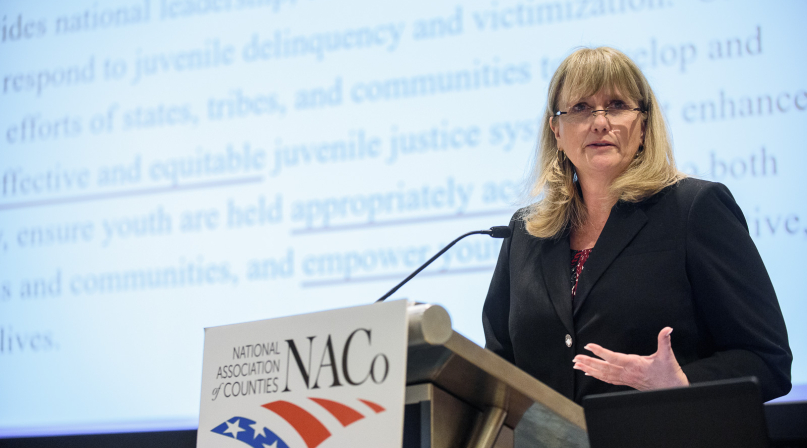DOJ grants: 'Identify a need in your community'

Key Takeaways
Andre Bethea, policy advisor for Corrections and Reentry, Justice Department, has a message for counties: “I can’t make awards if you don’t apply — creativity is on you,” he told members of NACo’s Justice and Public Safety Policy Steering Committee Saturday morning at the kick-off to the association’s annual Legislative Conference.
“Identify a need in your community,” he said. “There is a great deal of flexibility.”
Bethea, a former 911 operator in New York early in his career, amazed members with his ability to recall grant activity in each state and discussed with members which states and counties were actively seeking and getting grants, and which were not.
Members heard from federal partners and policy experts on the latest developments in justice-related policy issues. Discussion topics included the outlook for implementation of the Juvenile Justice Delinquency Prevention Act and the Second Chance Act, passed in the closing days of the 115th Congress.
“I’m for pushing funding outside of the beltway,” Caren Harp, administrator, Office of Juvenile Justice Delinquency Prevention, Justice Department, told the audience.
Several members of the committee had questions for Harp about prevention funding for girls and women since they’re seeing an uptick in crime in that demographic. Harp told them there’s $2 million a year to spend nationwide, and some said they thought that amount was too low. Harp said to be sure to let their representatives in Congress know if they need more funding in that area.
Attachments
Related News

White House signs executive order examining state and local preparedness
On March 18, President Trump signed an Executive Order aimed at aligning federal preparedness and response doctrines, while examining state and local preparedness capabilities. The order does not shift any responsibilities or costs to state and local governments, rather producing a set of recommendations for better collaboration across all levels of government.

CMS announces extended funding application period to improve the continuity of care for justice-involved individuals
On September 27, the Centers for Medicare & Medicaid Services announced $106.5 million in state planning grants aimed at improving healthcare continuity for individuals transitioning from incarceration.

Congress reintroduces bipartisan disaster mitigation bill to support homeowners
On March 5, Disaster Mitigation and Tax Parity Act (H.R. 1849) was introduced to the U.S. House of Representatives. This introduction follows the late-January introduction of the same bipartisan legislation in the Senate (S. 336). NACo previously supported this legislation and continues to advocate for its passage to support county resilience efforts.
